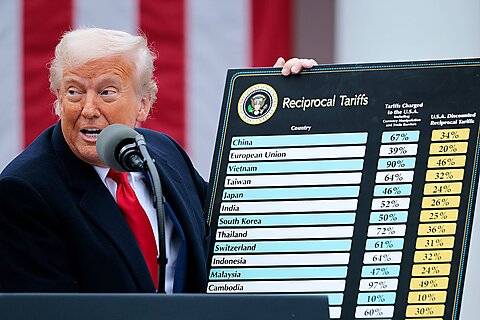The Trump administration has argued, in ongoing litigation, that revoking certain tariff authority would have “catastrophic consequences” and “lead to financial ruin.” The administration’s concerns are overblown and misrepresent the actual fiscal situation. America’s debt problem is driven by runaway entitlement spending and interest costs. Tariff authority does not change those fundamentals, and even under optimistic revenue scenarios, tariffs won’t avert a fiscal crisis.
What the Models Show
There is scant evidence to support the administration’s outlandish legal claims that revoking tariffs would lead to financial ruin.
The table below shows a handful of 10-year projections estimating new tariff revenue from the Congressional Budget Office (CBO), Yale Budget Lab, the Penn Wharton Budget Model (PWBM), and the Tax Foundation. Estimates range from $1.4 trillion in new revenue over 10 years to $3.3 trillion, depending on model design and reference range. Conventional budget scoring, for example, does not account for secondary economic effects resulting from changes in fiscal policy. Dynamic estimates do.
Across these independent models, the Trump tariffs are estimated to generate between $1 and $3 trillion in new revenue over the next 10 years or so. Those numbers are big in isolation, but they’re small next to the massive fiscal hole the US is facing. Between 2025 and 2035, for example, the CBO projects deficits will total $25 trillion. Part of that $25 trillion total stems from the so-called One Big Beautiful Bill Act (OBBBA) passed in July, which added $3.4 trillion in new deficits. Tariffs likely don’t even cover the fiscal costs of Republicans’ flagship tax legislation, let alone meaningfully improve the broader fiscal picture.
Note that only a portion of the projected revenue discussed above is at legal risk, categorized as International Emergency Economic Powers Act (IEEPA) tariffs. IEEPA tariffs account for roughly three-quarters of the total new projected tariff revenue under most models. Section 232 tariffs account for the remaining 25 percent.
To determine whether revoking these IEEPA tariffs would lead to “financial ruin,” we first need to create a fiscal baseline. I used the Congressional Budget Office’s January baseline as a starting point, incorporating the fiscal effects of the OBBBA, adding estimates of new tariff revenue based on recent economic modeling, and calculating the resulting debt service costs. The results are shown in Figure 1. Put simply, tariffs modestly reduce the debt burden over the next decade but fail to course-correct our disastrous fiscal situation.
Under every scenario, including the pre-OBBBA baseline, a post-OBBBA and tariffs baseline, and under a potential IEEPA strike-down, the debt-to-GDP ratio exceeds the World War II high-water mark of 106 percent in the late 2020s. The fiscal trajectory continues to deteriorate thereafter, irrespective of new tariffs.
The Tax Foundation’s Alex Durante and Garrett Watson generated a similar set of projections and expanded them forward, looking at debt growth over the next thirty years. Per their analysis, the debt-to-GDP ratio still rises above 160 percent by 2054, with or without IEEPA tariffs.
Critically, every model from the CBO to the Tax Foundation charitably assumes that the current and next two administrations will maintain the current tariff policy. In reality, the president could, at any point, unilaterally reverse some or all of the current new tariffs, thereby eliminating a significant portion of projected savings. It is foolish to pretend that tariffs must be the silver bullet to America’s debt crisis when they can be flipped on and off at the whim of one individual.
The Real Driver Propelling Us Towards Fiscal Crisis
The economic literature has found that a debt-to-GDP ratio above 78 percent has a consistently negative effect on economic growth. We are already on the path of fiscal ruin right now. Our long-term deficits are almost exclusively driven by just two programs: Medicare and Social Security, along with the resulting interest costs. A few trillion dollars in extra tariff revenue cannot fix those underlying commitments.
If we’re destined for economic disaster, it will be because both parties refused to take real steps towards reform, not because a subsection of presidential tariff authority was restrained.
The United States was on a perilous fiscal path long before OBBBA and the president’s unilateral tariff push. Entitlement programs, particularly old-age benefits and health care, will continue to propel debt higher until lawmakers address them. Tariffs won’t stop debt from breaching historic highs.
The path to fiscal stability runs through entitlement reform and spending control, not sustained reliance on executive-imposed tariffs.















